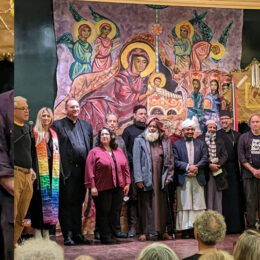American Thinker | Janet Levy | Mar. 1, 2008
At a time when 40% of young Muslims in the United Kingdom want to impose sharia law on the country and 36% favor executing apostates of Islam, the head of the Church of England called for the selective application of sharia law in Britain in the interest of social cohesion.
On February 7, 2008, Dr. Rowan Williams, the Archbishop of Canterbury and symbolic head of the worldwide Anglican Communion, issued what amounts to a capitulation to the encroachment of Islam and an accommodation to sharia. This Islamic theo-political-legal doctrine assigns second class status to Christians and Jews, utilizes a medieval system of justice that sanctions cruel and unusual punishments and mandates the inequality of women and non-Muslims.
Archbishop Williams’ suggestion is not unexpected given his 2003 speech at Princeton University, “Islam versus the West: Challenges Facing the Human Family.” In that address, the Archbishop called for the cultivation of an “enduring partnership based on shared values that make us human beings, that make us capable of receiving God’s gift of love and peace.”
But an examination of the intersection of Islam and traditional Western or Judeo-Christian societies reveals very little evidence of any “shared values.” Instead, glaring conflicts between the two are evident in the role and practice of religion in society, the concepts of moral behavior, the value of human life, personal responsibility and civil and legal rights.
Church and State
The most dramatic of these conflicts is the difference over the power religion holds in matters of state. Theologies shape societies, but the extent of their ability to control human interactions is in direct proportion to the extent of their mandate.
In the West, democratic governments preside over affairs of state and the church’s domain is subordinate to the rule of the land. Christ’s instruction to “render unto Caesar the things which are Caesar’s, and unto God the things that are God’s” embodies the separation of these realms from a theological standpoint. Separation of church and state is the underlying civil principle.
However, within Islam’s all-encompassing religiopolitical ideology, no dichotomy exists between the civil world of government and the theological world of religion. Unelected religious clerics, who enjoy lifelong reign, issue binding rulings on every aspect of people’s lives. Such rulings are indisputable and represent the will of Allah as interpreted from the Islamic teachings.
Democracy vs. Theocracy
From these two differing theological and civil positions, two vastly different methods of governing are derived. In most Western democracies, government is “of, by and for the people” or some approximation thereof. In essentially pluralistic participatory democracies, the populace decides by a majority vote who among them will best represent their interests and will advance the most beneficial policies for the nation as a whole. A political leader who doesn’t perform according to the will of the people can be voted out of office.
But in Islamic nations, rigid theocracies, for the most part, rule in accordance with Islamic scriptures. Religious practices and laws are enforced under the watchful eye of religious police, empowered to beat or imprison violators. Clerical leaders control all aspects of life, with the primary concern obedience to the words of Allah and Mohammed. Religious leaders strictly interpret the Islamic doctrine and dissent is prohibited and viewed as un-Islamic.
. . . more




1 thought on “The Fallacy of Shared Values”
Comments are closed.